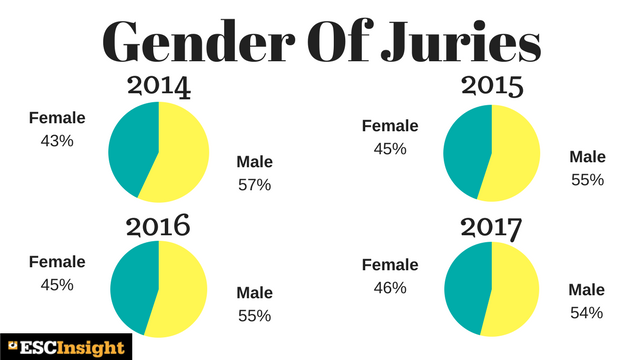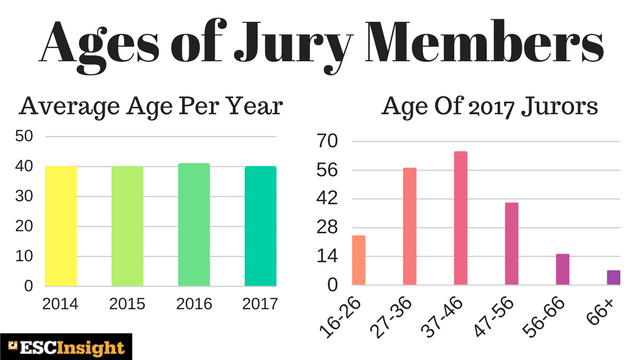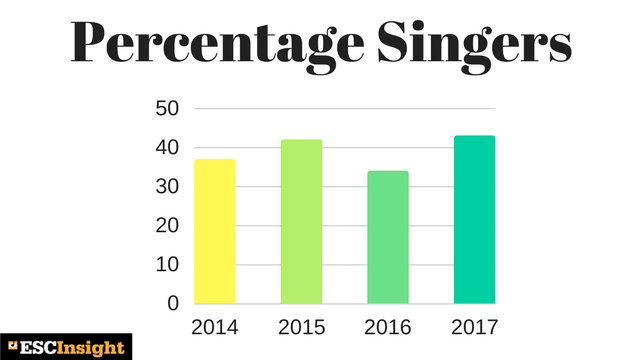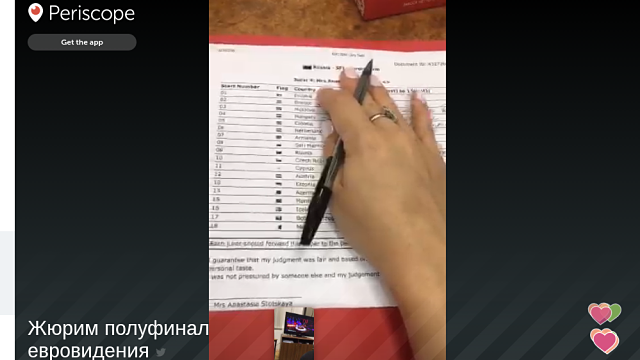Jury Voting On Full Display Again
It was the Copenhagen edition in 2014 where the first reveal of jurors were made public before the live shows by the European Broadcasting Union. In a move designed by the EBU to ‘increase openness’ which has continued every year since.
The 2017 rules reiterate the values for the EBU in relation to the selection of juries. The official statement from EBU clarifies that:
“The criteria for selecting National Jury members are as follows:
- To increase diversity, music industry professionals can only take a seat in a National Jury if they have not been in the National Jury during the previous two editions of the contest.
- Members of the National Juries must be aged of at least 16 on the day of the voting session.
- They must also be named on air during the ESC by the national commentator(s) in the territory concerned.
- Each of the participating countries will implement a jury of five music industry professionals with a variety in terms of age, gender, background (including a chairperson). As a rule of thumb, the composition shall be of no more than 3 persons from the same gender.
- Members of the National Juries must not be employees of Participating Broadcasters.
- Members of the National Juries must pursue one of the following professions within the music industry: radio DJ, artist, composer, author of lyrics or music producer.
- All members of the National Juries shall be citizens of the country they represent.
- No member of a National Jury shall be connected in any way with any of the participating songs entered and/or artists performing in the ESC in such a way that they cannot vote in complete independence and impartiality.
The EBU rigorously reviews all submissions for Jurors, in close consultation with the broadcasters. All jurors sign an agreement with the EBU before taking part, confirming that they will remain impartial and cast their votes strictly on the performances in the shows that they adjudicate.”
The new voting system that debuted last year places more scrutiny on the jury votes than ever before. No longer coupled to televoting, the jury results will never again just be visible to the Eurovision geeks who check the results from post-show Excel spreadsheets. The full fanfare of jury scores comes across like random noise as we jump from shouting presenter to shouting presenter. Each vote is made up from five people’s opinions from watching the previous night’s rehearsal in TV station back room offices. Their tastes are as eclectic as such a scenario creates. The results of these backroom descisions now take over European television for over thirty tense and mind-boggling minutes.
Each individual juror this year will have 0.24% of the total vote in the Eurovision Song Contest Grand Final this year, and once again their decisions will be in prime focus.
Four Years Of Transparency
This is the fourth year in a row where the EBU have revealed the names and professions of jury members before the start of the voting. How does this year’s bunch compare with previous years?
One of the key aims from the EBU has finally been achieved, gender balance across the different juries is better than ever before. With a five person jury a complete 50/50 split of jurors is impossible to achieve in each individual nation, but for the first time ever no jury has more then three male members. There are slightly more males overall, 112 to 97 females, (Austria still have one juror to announce) but each jury is now a 3-2 gender split.

The 2017 jurors have a larger percentage of females than ever before (Image: Ben Robertson, ESC Insight)
Once again as well there is a wide spread of data across the Eurovision Song Contest jurors, with 16 year olds like former Junior Eurovision star Sofia Tarasova in juxtaposition against UK chairperson Mary Hammond aged 76. However despite the wide spreads of ages the average age of jurors appears to be unchanged at a very stable 40.
Each jury should have a balance of gender, age and profession according to the EBU’s rules. Gender balance may be fairly acheived but age variables are not yet balanced across all broadcasters. I would question how much Australia have achieved this with a range of just 11 years between 44-year-old Steve Capaldo and 33-year-old Peter Hayward. Last year Australia’s also had a nice middle-aged jury too, with just 15 years between their oldest 53-year-old and youngest 38-year-old. That jury gave Belgium’s ‘What’s The Pressure‘ top marks.

The average age of jurors has been static for the last four years (Image: Ben Robertson, ESC Insight)
The professions of the different jurors create a constant source of controversy. According to the EBU’s official website in the rules section, all jurors must follow a very strict small section of professional roles in the music industry; radio DJ’s artists, composers, lyricists or music producers. However once again there are people on juries across the continent with roles far beyond this narrow spectrum.
Is it fair with these criteria to include Kevin Abela, the principal trumpet player for the Maltese Philharmonic Orchestra, as one of our judges? Vytenis Pauliukaitis, the Lithuanian ‘Director of TV programmes and entertainment events’ appears to have been working recently for Lithuania’s equivalent to Strictly Come Dancing. Is his involvement that of a music industry professional, or more somebody a professional of the TV industry? Where do the Azeri ‘artistic director’ and ‘theatre director’ fit into the grand scheme of music industry professionals?
The EBU need to improve their internal documentation to make it relevant and accurate so the increasingly important jury process can be held to the high regard it needs to be. At least it should be consistent with other parts of the operation, the news of jury names merely reveals jurors ‘must pursue a profession in or related to the music industry’.

The 2017 edition has a larger number of ‘singers’ on juries than we have previously had (Image: Ben Robertson, ESC Insight)
One remark to make is that, from the very limited data provided this year on each juror’s background (in previous years a short 50-70 word bio was provided as well as their job title, now most jurors are described by one word) it appears there are a larger number of jurors with a singing background this year than before. The correlating factor here would suggest a slight nudge more than usual towards songs that have well sung power vocals above intricacy, demonstrated by the singers group in 2014 placing ‘Undo’ above ‘Calm After The Storm’.
However 2014’s previous study suggests the professional background only has a minor impact on Eurovision voting taste, the biggest correlating factor being who you watch Eurovision with rather than your own personal background.
More recently last year’s German jury had five named ‘singers’ and gave 12 points to Israel, and Spain’s 2016 jury had four failed National Final acts from the same year and awarded 12 to ‘LoveWave’. That does though add a subtle hint towards singer-heavy juries swaying towards big singer performances.
Any Conflict Of Interest?
One point we have brought up previously with ESC Insight has been to question the impartiality some music industry professionals can have in the Song Contest. One of those positions in particular has been with record label executives having a seat on the juries of individual countries.
In 2016 Franz Pleterski was on the Austrian jury and awarded a top three position to both ‘Walk on Water’ and ‘J’ai Cherché’. Both of these songs were from Warner Music, who Franz is Marketing Director for in Austria.
Make what you will of that scoring, but also note fellow Warner employee Marcela Kočandrlová only gave a 4th and 7th place to the two Warner songs from the Czech jury, in keeping with the other scores from her compatriots. There is no clear international record label influence that we can make out this year, with only Italy having one named label representative, from an independent label.
Per Sundres has been a well known face of Eurovision for Norway for many years, and he heads Norway’s jury this year. His involvement on this year’s ‘Adresse Kiev’ preview show has left many people to feel his role here, revealing his favourites publicly on NRK’s preview show may compromise his ability to be a fair jury member. He is already quoted as saying he believes Sweden ‘will win’ for example to the Norwegian public. While there is no rule against this it was noted the same issue last year led to SVT withdrawing Wiktoria from jury service in 2016. She is back for 2017.
Furthermore too worth questioning is the Belarussian chairperson Inna Mardusevich, who is listed as an employee of the Belarussian Ministry of Culture. Inna was previously on the jury in 2014 placing Russia 1st, Azerbaijan 2nd and Malta 3rd, with Conchita Wurst in 22nd place.
It’s funny that how the official line is that ‘politics should be kept out of the Contest’ that members of the political establishment can take a seat on the jury seemingly without batting an eyelid. Nevertheless, Inna meets the music industry connection requirements as she also a known vocalist.
For interest, the Eurovision rules mean that countries must not choose a juror again for two years after they have been chosen. However Inna is not the only juror who was involved in the 2014 edition to give points. She is joined by Marju Länik (12 points to ‘Undo‘), Rasmus Rändvee (12 points to ‘Undo‘), Nelly Ciobanu (12 points to ‘Miracle‘), Magdalena Tul (12 points to ‘Calm After The Storm‘) and Michael Cederberg (12 points to ‘Running‘).
Why Do We Care About The Jurors?
Last year with that jury process being as open as it was for the first time meant the format was also open to all the flaws. Let us not forgot the Russian jury member who thought it was cool to live stream her jury room process to the entire world, leading to her disqualification. In addition for the second year in a row we had a jury member vote the complete wrong way around. Thankfully it didn’t impact on the final winner, but in reality Ukraine’s victory should have been just nine points. Facts like this simply should not be happening, but the casual attitude to the jury system means these scandals and mistakes are no longer a surprise.

Screenshot of the livestream from disqualified Russian jury member Anastasiya Stotskaya (Image: Ben Robertson, ESC Insight)
There’s also time to jump in with Russia’s withdrawal here. Yes there are so many more factors than low jury scores going on here. But if it’s enough for Philip Kirkorov to say Russia shouldn’t return until there is reform then this is something the EBU have to get right to defend themselves and get one of the biggest markets to the Song Contest to return.
This year the release of the jury data still misses important data, such as Austrian jury member unknown (although this was acknowledged at the time of the publication).
The last thing we want is for those scandals to impact on the final result and lead the whole Eurovision Song Contest to farce. Our jury system should be there to make it fairer. In one way it does that, with the transparency of point reveals a welcoming addition to Eurovision in recent years. But on the other hand it does so by accident, without the oversight process at its core to keep it as squeaky-clean and ultimately as professional as it needs to be. I want these jurors to succeed to make the best choice for the Song Contest, free of scandal year after year after year. We’re not quite there yet.










Great article – you cover all the subjects that seemingly nobody else wants to! And in double quick time!
What would be a nice touch is if the EBU said at least one of the jurors for each country has been involved with the Contest in the past – Romania have more or less all theirs as ex-singers, whereas the UK rarely does…
I think the main issue with the juries is the general concept of the Eurovision jury. I’m sorry to say that but in its essence it’s just NOT professional enough. First of all, it’s obvious that there are no specific criteria for ranking the songs like lyrics quality, composition quality, stage performance quality, vocal mastery, etc. The only criteria are connected with the demographic characteristics of the jury members but NOT focused on the essential: the SONGS themselves. The juries are not clearly instructed how to judge so they decide to interpret the ranking subjectively. That’s why we have “punished’ songs every year and illogical rankings of the same song from different countries .
So, my suggestion is that there have to be separate and very clear criteria for assessing each song; 1. lyrics quality, 2. composition quality, 3. vocal mastery, 4. stage performance, 5. hit potential. All these should be 5 different rankings made by several (2-3) experts EACH from the prospective industry: lyrics (lyricists, poets only), composition (composers only), vocal mastery (vocal coaches, singers only), stage performance (stage directors from TV/theater, music video directors, choreographers), hit potential (music producers, radio DJs). This makes up about 10 to 15 jury members per country which makes it a lot more professional and solid. 😉 They rank only the top 10, then rankings are combined and recalculated to achieve the final jury top 10 of the country.
Main criteria for measuring how many points each song’s component deserves are: originality of product, difficulty of execution and contribution to the development of the respective music genre. Songs are not ranked against each other (because you cannot rank any music genre as better than another, it’s meaningless) but according to their new interpretation of their own genre. Simple example is Loreen Euphoria – a beautiful, difficult uptempo ballad with a standalone choreography and perfect vocals. That is a new interpetation of dance music elevated to the next level. 😉 There are many more examples like this. My point is that right now EBU is more focused on the individual characteristics of the jurors themselves but not their true function: to assess song quality CORRECTLY. They focus on the superficial but not the meaning. That’s why many successful artits don’t ever want to touch upon this event – because they are not sure their work is gonna be appreaciated professionally.
I completely agree with Ahinora. We need to know WHY the jurors make their decisions, i.e. on what criteria. It would add a huge layer of transparency and would show that they aren’t just picking songs based on frivolous reasons. But we also need to know HOW they judge. Do they all base their judgements off of the dress rehearsals? Are they allowed to bring in translated lyrics of the songs? Are they privy to information regarding the context of the song? Are they allowed to listen to the songs in advance or are they kept in the dark until the rehearsals? Or are they just thrown together in a room the night of the rehearsal and told to judge on what they see in front of them with no other information?